Rick's b.log - 2022/02/13
You are 18.189.189.251, pleased to meet you!
Rick's b.log - 2022/02/13 |
|
| It is the 18th of December 2024 You are 18.189.189.251, pleased to meet you! |
|
mailto: blog -at- heyrick -dot- eu
Ingredients:
Equipment:
Preparation time: About half an hour (chopping and frying stuff).
Peel the veg and chop into smallish bits. Make nice even cubes if you're a perfectionist. Make varying sizes if you appreciate some variety in your mouth.
The predominant features of this meal are beef and potato, and since the pack only had two potatoes, I added another two from the ones I grew last year.
Put the vegetables into the multicooker and drizzle vegetable oil (I use sunflower oil) on top and stir until they're well oiled.
Switch on the multicooker and select the Fry programme (may also be called something like Saute or Wok). Set the timer to 15 minutes (this may be the default) and fry the vegetables while stirring them up every twenty seconds or so.
The caption is to freak out any vegetarians reading. ☺
It is advised that you cut out any of the nastier pieces of fat. In cheap meat you'll likely find pieces that your knife just doesn't want to cut through. Carefully slice alongside the fat and then grab and pull. You're not aiming for perfection.
Fill a kettle and switch it on.
Then place the meat into the multicooker with a little oil and begin the frying programme.
After a little while (5-7 minutes) you'll see that the meat liberates a lot of liquid, and rather than frying, it is boiling in a sort of brown sludge.
The brown sludge isn't blood, it's actually myoglobin which is a protien found in muscle tissue. It's purpose is to carry the oxygen through the muscle. It is normally reddish (like blood) but the heat makes it turn brown (also like blood).
When you get to this point, continue cooking for another minute or two and then switch the multicooker off.
Note - do not be tempted to try the meat no matter how nice the cooking smells. Cheap meat, at this stage, is practically inedible. It needs to be stewed. Eat a piece of the potato instead. ☺
Don't chop the herbs (makes them harder to remove after cooking), just place them into the stew.
It is always better to use fresh herbs. Preferably right from the plant in your garden, or from a pack in the supermarket failing that. Note that for for fresh herbs, a little goes a long way, so you don't need much.
Chopped and dried herbs in a little glass jar should be your last resort.
DO NOT ADD STOCK CUBES! If your stew turns out insipid and meh, you need better ingredients rather than chemically enhanced flavourings. Your beef should taste of beef without adding beef flavouring!
I do not like my food salty, so I do not add salt at this point. You may wish to.
You may like to add a glug of wine to add extra flavour? I can't digest alcohol so I don't touch wine, plus I find it's taste in stews and the like to be a little "tangy".
Select the Stew programmer (Mijoter in French) and set the timer to four hours. Let this one run nice and slow. Don't rush the meat. Close the multicooker's lid, and leave it to make magic happen.
This is because I fancy my stew over rice. But you may prefer pasta - fusilli, the corkscrew one, would be a nice texture to accompany the stew. Alternatively, just slosh it into a bowl and enjoy it as-is.
The benefit of rice is that the rice cooker can be left to get on with the job, so less effort required to prepare the meal.
Don't be afraid to experiment. Fancy a drained stew (leaving the juice in the bowl) with a side of macaroni cheese? Go for it!
I wouldn't lose any sleep over this, there are likely more toxic things (hormones, growth enhancers, antibiotics, and weedkillers, etc etc) in the meat than anything you're likely to get from the rice, not to mention pesticide residue in the vegetables (non-organic farmers generally still use glyphosate even if several countries have banned it's use by normal gardeners).
But if you're worried, soak the rice overnight in cold water, then throw the water away and rinse the rice before cooking. That should help. And favour organic produce and meat, as the controls for organic food products are far stricter than for regular industrial farming. After all, feeding crushed up animal remains to cows is thought to be what created Bovine Spongiform Encephalopathy (leading to possible vCJD in humans) due to a type of prion, which is a misfolded protein which can further transmit this error into other proteins, leading to neurodegenerative diseases in, well, any animal with a brain - including humans. Well, some of us at least. The ruling classes may be exempt from this concern.
The rice: if the rice cooker hasn't started itself when there's about an hour remaining on the timer, disable the timer and start the rice cooker manually. The machine may not be counting the time it takes to bring the water up to boil (does your rice maker have a little spinning animation at the beginning of the rice cooking programme?). A typical rice cooking programme takes 45m to 1h15 from cold, depending on quantity.
Oops, I started the rice a little early (didn't account for the pre-soak speeding up the rice cooking as I don't normally presoak).
At this point, it's worth taking out a piece of meat to ensure it is sufficiently well cooked. You shouldn't have to give your mouth a workout in order to chew it.
The final touches are to remove the herbs and toss the rice (pasta etc) in some butter. Then serve the stew on the rice (pasta etc).
And, here it is. Some in a bowl to eat right away, and some left to cool down in a plastic container ready to take to work tomorrow.
I decided that since the meal was flavourful, I didn't need any salt or pepper. Instead, it was served with a San Pellegrino Limonata and some Netflix.
Well worth the wait!
Sunday Stew with a Multicooker
Today's recipe, a nice beef stew.
Requirements
Depends entirely upon how many people you want to feed, and how much. For the recipe as given here, it is for me to eat today, and to have some to take to work tomorrow.

Ingredients.
Cooking time: About four and a half hours (15m/10m frying, and 4h stewing).
Prepare the vegetables
I bought a for-soup pack of veg that contained leek, onion, carrots, and potatoes. Also some other root vegetable (parship?), but that went in the bin as I don't like them.
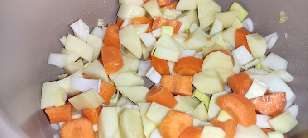
The vegetables, ready to cook.
You want the vegetables to start to brown. That's why the oil. It's to trigger the beginning of the Maillard Reaction, which will enhance the flavour of the stew.
You want them lightly browned, not incinerated.

Some nicely cooked vegetables.Prepare the meat
Now the ickier part. Take the meat and chop it into little chunks.
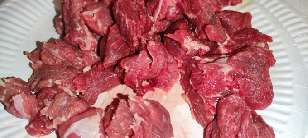
Dead baby bits.
Soggy meat.
There may also be some degree of water content depending upon the honesty of your supermarket/butcher.
Flavour enhancement
As the frying programme cools down (it's okay to leave it), sort out your herbs. In my case, this meant popping outside with a pair of scissors in order to clip off a piece of thyme and a bay leaf. I would have added rosemary but... dammit, I do have rosemary, don't I? Oh well, I forgot...

Herbs to enhance the flavour.The stew
Leave the meat in the bowl and put the vegetables on top. Add hot water (from the kettle you recently boiled) until everything is just covered. Then place the herbs on top.
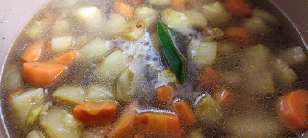
Pre-stew.
Likewise I prefer to add pepper when I'm eating, and not during cooking.
I prefer authenticity here, so it's just meat and veg and fresh herbs.

Cooking mode: stew, four hours, make it so.Rice (optional)
Using my older rice cooker, I set up one measure of mixed rice (white, brown, wild) to two and a half measures of water, and set the delayed start to match the timer of the multicooker, so in theory both will be ready at about the same time.
Obviously this isn't quite as simple a proposition if your multicooker is your rice cooker, or if your rice cooker is one of the simple heated bowl types.
Poisons
A lot of rice contains arsenic, as well as potentially toxic compounds (such as lead). These are absorbed into the plant from the roots from contaminated groundwater and/or soil. You're likely to only hear about this in the context of an ill-researched Daily Mail style health scare as it's extremely rare to be poisoned by rice. Certainly, Asian cultures eat a lot of rice and they're not all dropping dead of arsenic poisoning.
That being said, it is perhaps worth considering avoiding rice from America and Thailand as these two come up as having the highest quantities when looking at arsenic levels in rice.
Brown rice has higher concentrations than white rice (as it's in the bran), so brown rice has higher levels of good stuff, and also higher levels of bad stuff.
It doesn't matter whether the rice is organic or not as it's an environmental contamination.
Tea is always good
With one or both machines set to go, the next (and arguably most important ☺) task is to make use of the remaining water in the kettle. Bring it up to boil again, and while it's doing that prepare a mug and teabag.
Things to check during cooking
The stew: in a word, don't. There's a little valve on the top of the multicooker to let steam and lovely smells escape. Let your mouth water, but do not open the multicooker. The buildup of steam is a part of the cooking process. Don't disturb that by opening the lid.
Don't worry if this causes timings to get messed up. Both the rice cooker and the multicooker have "keep warm" modes that they'll switch over to when their respective programmes have completed.
It's also good to leave the rice sitting in water for a couple of hours to help it absorb water for more even cooking.

Cooking happening.
Never mind, the keep-warm function will take care of any differences.
The end result
After a horrible four hours of resisting the temptation to gnaw on a chocolate bar or two, it's time to open the lids of both of the cookers, and be assaulted by the smells of both. Whoa!
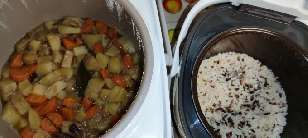
The food cooked.
If it's not good, well, add some hot water and another couple of hours stewing. But after four hours it ought to be good.
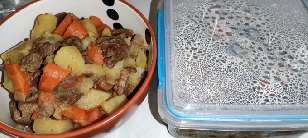
Stew and rice, served.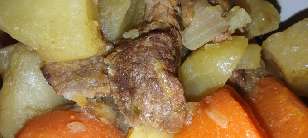
Gratuitous macro shot.
J.G.Harston, 13th February 2022, 19:02
| © 2022 Rick Murray |
This web page is licenced for your personal, private, non-commercial use only. No automated processing by advertising systems is permitted. RIPA notice: No consent is given for interception of page transmission. |